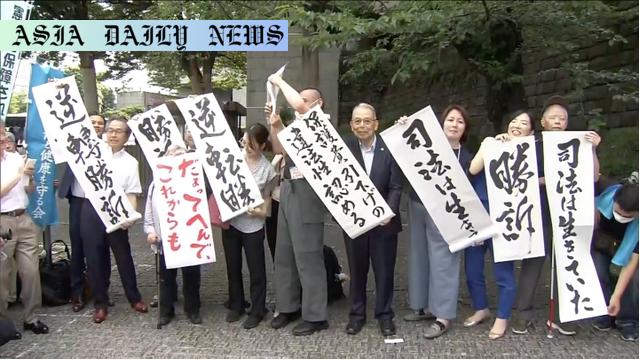Welfare Benefits: Japan’s Supreme Court declares welfare reductions unlawful but denies compensation, prompting future challenges.
Japan’s Supreme Court ruled welfare benefit cuts from 2013-2016 unlawful.
Recipients sought compensation; the court denied monetary payouts.
Ruling may affect future state welfare policies and compensation demands.
Presiding justice criticized decision-making as inconsistent and lacking expertise.

Background on the Welfare Benefit Cuts
In a significant ruling, Japan’s Supreme Court has declared that welfare benefit reductions imposed by the government between 2013 and 2016 were illegal. During this three-year period, the health and welfare ministry reduced payouts by as much as 10% in stages. The decision was justified by citing the need to adjust to deflationary price trends. At the time, approximately 2 million individuals depended on these benefits for their survival. The ruling by the Supreme Court’s third petty bench has nullified these reductions but stopped short of directing the government to compensate affected individuals.
The Legal Challenges and Their Implications
Multiple lawsuits were filed by welfare recipients across Japan. These plaintiffs argued that the reductions violated the legal requirement to ensure a minimum standard of living, a tenet central to the welfare system. Of the over 30 lawsuits, this decision addresses cases brought forth in Nagoya and Osaka. Justice Uga Katsuya presided over the case and noted that the ministry’s decision lacked adequate expertise and consistency. He criticized its reliance solely on the consumer price fluctuation rate, deeming the procedures flawed and unlawful. While the ruling unifies the court’s judgment on such cases, it stops short of providing monetary relief to victims of the welfare cuts.
A Unified Judgment and Future Ramifications
This Supreme Court decision comes as a landmark ruling, particularly because it resolves splits that had emerged in lower courts regarding the legality of the welfare cuts. However, by refusing compensation, the court may have set a precedent of limited accountability for government decisions. The judgment raises important questions about the government’s ability to ensure a minimum standard of living and may prompt a review of current welfare policies. Furthermore, the decision opens the door for increased demands on the state to address lost benefits for the impacted individuals, potentially creating a ripple effect across welfare laws in Japan.
Public and Policy Responses
Following the ruling, public discourse has been stirred on the adequacy and inclusiveness of Japan’s welfare system. Critics point out that the denial of compensation undermines justice for those adversely affected by illegal cuts. The onus is now on the government to determine how it can rebuild trust among low-income families and welfare recipients. Policy experts suggest that the health and welfare ministry must adopt a comprehensive and transparent approach to decision-making, ensuring that future policies align with the legal standards set forth by the country’s highest court. The ruling also raises questions about potential reforms to safeguard against similar unlawful reductions in the future.
The Broader Impact on Social Welfare Systems
Globally, Japan’s case illustrates an ongoing challenge for nations to balance fiscal policies with the imperative to support vulnerable populations. The court’s decision casts a spotlight on the processes governments use to determine the adequacy of welfare benefits, urging policymakers worldwide to prioritize evidence-based decision-making. The interplay between economic conditions and welfare policies requires a nuanced approach, something the court highlighted as lacking in the original decision-making process in Japan. Ultimately, this case underscores the necessity of robust oversight mechanisms to ensure that welfare systems effectively serve their intended purpose.
Commentary
The Supreme Court’s Landmark Decision
The Supreme Court’s ruling nullifying the welfare benefit cuts marks a crucial moment in the ongoing dialogue about social welfare systems in Japan. While the court identified flaws in the government’s rationale and decision-making process, it stopped short of ensuring full justice for the plaintiffs by denying compensation. This approach mirrors a broader hesitance to hold governments accountable for missteps that disproportionately affect vulnerable populations. The verdict not only addresses past grievances but also sets a cautionary tone for future welfare policy decisions.
The Role of Policy Transparency and Accountability
This case brings to light critical gaps in the transparency and accountability of fiscal policy decisions. Justice Uga Katsuya’s critique of the government’s reliance exclusively on deflationary benchmarks reinforces the importance of multi-faceted and expert-led decision-making. Welfare systems are designed to act as safety nets for society’s most marginalized members. By failing to meet this standard, the ministry’s actions underline the potential harm caused by poorly informed policies. Japan should consider this verdict as a call to strengthen oversight mechanisms and build frameworks that prioritize societal welfare over fiscal pressures alone.
Looking Beyond Japan: Implications for Global Welfare Policies
The ramifications of this ruling extend beyond Japan. As nations grapple with economic challenges, trade-offs between fiscal discipline and social welfare often become battlegrounds for legal and ethical debates. This case exemplifies the fine line governments must walk to ensure policies remain equitable and inclusive. Moreover, it highlights the judiciary’s role as a check on executive overreach, reaffirming the importance of maintaining judicial independence as a safeguard against unlawful policies. The broader lesson here is the need for governments to be proactive rather than reactive, integrating feedback mechanisms that prioritize the voices of affected populations and experts alike.


